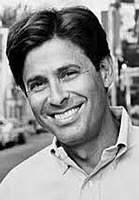Profile — Roger Weisberg
If you meet Roger Weisberg at a cocktail party you’ll likely not suspect he’s responsible for over thirty documentaries on some of the thorniest issues facing American families today. Why? Because he’s so…well…nice. How can someone immersed in the gritty details of poverty, drug addiction, foster care abuses, welfare reform and every possible angle of our teetering health care system be calm, seemingly well adjusted and dare I say, the antithesis of Michael Moore? Weisberg answers with a clear-eyed earnestness that may explain his success, “I can’t imagine a better job than that!”
It’s a surprising answer from someone who never intended to make films. Weisberg graduated from Wesleyan University and worked as a teacher before landing a job in 1976 at WNET as a staff producer. There he worked with the producers of “Help Yourself,” a weekly local public affairs television series, teaching them about relevant consumer issues and law. Weisberg quickly understood that television was the best way to bring social concerns to a wide audience. With a lot of enthusiasm, but no training in the mechanics of film or television, he was hired to create content for the show. “I learned all of the technical craft skills by just being thrown into the trenches and having to come up with these weekly programs…” says Weisberg.
“Help Yourself” won several Emmy awards during its three year run, but Weisberg wanted greater editorial and distribution control over his films. In 1982 he created the independent production company Public Policy Productions and to date, has won over 100 awards for his work including Academy Award nominations for “Sound and Fury” (2000) and “Why Can’t We Be A Family Again?” (2003). All of Public Policy Productions’ films have aired on PBS, but “Sound and Fury,” an emotional story about the controversial cochlear implant, and “Road Scholar,” a 1993 cross-country road trip with poet and NPR humorist, Andrei Codrescu, have also had broad theatrical releases. Weisberg’s most recent film, “Money and Medicine,” a timely look at runaway health care spending in America, will air on WNET (Channel 13) on September 25, 2012 at 9:00 pm. A feature length version will be shown at Lincoln Center’s new Elinor Bunin Munroe Film Center as part of the new “Art of the Real” program on June 4, 2012 at 6:30 pm.
So how does Weisberg decide what stories to tell? He has a list of criteria: am I passionate about it, is it timely, do I know something about it, is it a story I can tell and can I get funding? Guess which one is the toughest to answer? According to Weisberg, finding funding is the single biggest challenge for documentary filmmakers, especially as many of the foundation grants he’s relied on in the past dried up in the aftermath of the 2008 economic crisis. “In really good times a film like ours is an affordable luxury and in tough times it’s kind of the first thing to go,” says Weisberg.
Nonetheless, Weisberg continues to “read the tea leaves,” as he puts it, in order to find new angles on stories he feels compelled to tell. This is how “Money and Medicine” evolved. In 2007 Weisberg made “Critical Condition,” an intimate portrait about access to health care for the uninsured. The film was designed to lend support to political efforts for universal coverage. After Obama’s election and the advent of so-called Obama care however, Weisberg saw that focus was shifting from availability to cost - specifically regarding how increasing health care costs and a more-is-better attitude towards tests and treatment may ultimately bankrupt the country.
Because of Weisberg’s history of studying health care in America – “Money and Medicine” is his ninth film on the topic – he had access to dozens of hospitals including UCLA, one of America’s most expensive hospitals, and Intermountain Medical Center in Utah, a hospital using patient treatment outcome data in an effort to provide more effective care often less costly than the national norm. In “Money and Medicine” Weisberg deftly picks through the emotional and ethical minefield of how we deal with death and disease in the United States and gives us a measured picture of how things are now and how they can potentially change.
Topics as nuanced and complex as these are tough sells, not just for prospective funders, but for audiences as well. Weisberg is undeterred. He considers his job as filmmaker to be that of educator. “If I can enable viewers to understand the opposing point of view and still have them come to a conclusion, I may be able to move, ever so slightly, public opinion,” he says. And this, in fact, is his main objective. While he always has a point of view, he lets personal perspectives and factual data tell the story without hysteria or hyperbole. The results are powerful, intelligent and carefully considered looks through windows many of us would rather ignore. But getting people to look is the first step towards effective change. In this sense Weisberg is a true altruist. Passionate, committed and fair, it’s no surprise that Weisberg has the anonymous quotation, “Nothing to Excess – not even moderation” hanging prominently on a plaque in his office. It takes a special person to work so diligently on behalf of others – maybe even an extremist.


